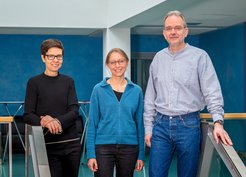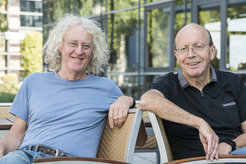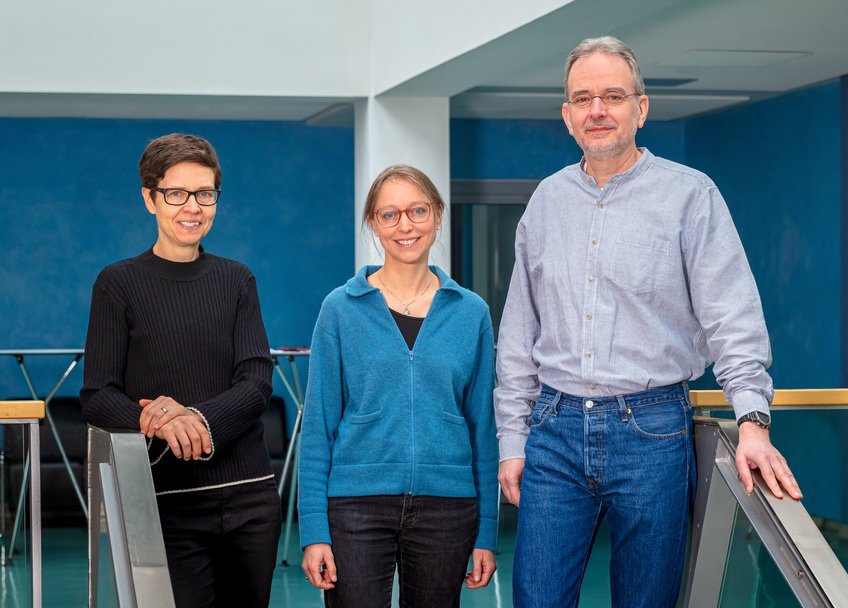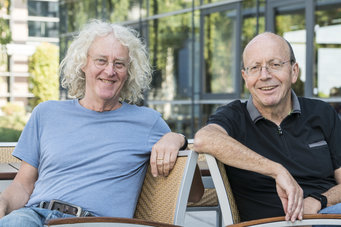Max Planck Institute of Molecular Plant Physiology welcomes new research departments.
The Max Planck Institute for Molecular Plant Physiology (MPI-MP) is pleased to announce that as of February 2023, the leadership team at MPI-MP is complete again. With the appointments of Prof. Dr. Claudia Köhler and Prof. Dr. Caroline Gutjahr, the institute has succeeded in hiring two outstanding scientists who will conduct excellent plant research together with Prof. Dr. Ralph Bock.
Research on exciting symbiosis newly established at the MPI-MP
In her newly established department of "Root Biology and Symbiosis," Prof. Dr. Caroline Gutjahr, who has just been appointed director of the institute, is devoting herself to the highly exciting topic of a symbiotic community, known as mycorrhiza, between certain soil fungi and plant roots, which is beneficial to both sides.
Fungi, unlike plants, are not capable of photosynthesis. They must therefore supply themselves with organic nutrients in other ways. Mycorrhizal fungi permeate the soil with a huge network of hyphae. The hyphae are thread-like cells of the fungus which form a fungal network in the soil like a large spider web. They absorb nutrients and water for the fungus. The mycorrhizal hyphae can penetrate roots and enter into a symbiosis with a plant. Nutrient exchange takes place at the branched fungal hyphae within the plant root. These tree-like structures also give the symbiosis its name: derived from the word “Arbuscula”, Latin for little tree, it is called arbuscular mycorrhiza. In this symbiosis, the arbuscular mycorrhizal fungi supply their plants with important nutrients such as phosphate and ammonium and make water more readily available to them. In return, the fungi receive carbohydrates and fatty acids from the plants.
For a long time, it was thought that the fungi only receive carbohydrates from the plant. In reality, however, most of the substances supplied by the plants are fatty acids. Ms. Gutjahr was already able to refute this doctrine in 2017 together with her colleagues and in cooperation with other research groups, so textbooks should actually be updated accordingly.
Since her appointment in April 2022, Ms. Gutjahr has commuted between her obligations at her previous place of work, the Technical University in Munich and the MPI-MP. She has already started to build up her department and is now very much looking forward to conducting research at her new location. Regarding her research area, Ms. Gutjahr explains, "I am working on the molecular mechanisms necessary for the establishment and functioning of this symbiosis, which is equally beneficial for plants and fungi. I am also curious how and by which factors the establishment of the fungus-plant symbiosis is influenced." Ms. Gutjahr finds it particularly exciting to be able to set her focus not only in the area of basic research, but also to potentially breed mycorrhiza-optimized crops with which she could contribute to more sustainable agriculture.

Heredity is more than the sum of genes
In the second department "Plant Reproductive Biology and Epigenetics", which was also just recently established in 2021 with the appointment of Prof. Dr. Claudia Köhler, the research focuses on changes in gene activities that are not based on a change in DNA sequences but are triggered by other mechanisms. The basis for this are often chemical changes in the basic building blocks of the genetic material or in proteins that bind to the DNA. Many cellular regulation and differentiation processes are controlled by such epigenetic mechanisms. Ms. Köhler's department focuses on epigenetic processes that regulate seed formation in flowering plants. Although seeds and the nutritive tissue they contain, the endosperm, are an important part of our nutrition, relatively little is known so far about the molecular and (epi)genetic mechanisms of seed formation and thus about the developmental basis of agricultural yield. Prof. Köhler has succeeded in developing and establishing a whole range of methods and materials that will make it possible to answer long-standing questions in seed biology. Her research is of fundamental interest and can potentially provide important insights into crop yield formation.
Exploring genetic information outside the nucleus
The third in the group is Prof. Dr. Ralph Bock, who was appointed to the institute in 2004 and heads the department of "Organelle Biology, Biotechnology and Molecular Ecophysiology." His department focuses on DNA-containing organelles such as chloroplasts, where photosynthesis takes place, and on mitochondria, which are the power plants of cells. Prof. Bock studies how the genetic information of these cell components is structured and how it is translated into proteins and traits. Another focus is on how this genetic information can be modified for basic research as well as for applied biotechnological questions. Molecular ecophysiology is about the incredible adaptability of plants to environmental changes, and about how and why which plants and plant species perform best in certain locations and under which environmental and climatic conditions.
Commenting on the new research constellations at the institute, Ralph Bock, as managing director of the institute, says: "It is exciting to start with new research priorities, and I am looking forward to unveiling new knowledge with my colleagues and their newly established departments. My emeriti colleagues Lothar Willmitzer and Mark Stitt remain closely associated with the Institute."
Emeriti

left: Mark Stitt, right: Lothar Willmitzer
The founding director of the Institute Prof. Dr. Dr. h.c.. Lothar Willmitzer headed the Department of Molecular Physiology from 1994 to 2022. The main topic of the department was the analysis of primary metabolic processes and their mathematical description. This included nutrient uptake and transfer as well as the assembly of plant macromolecules. Prof. em. Willmitzer founded numerous companies, for which he received the Stifterverband Award in 2015.
Prof. Dr. Dr. h.c.. Mark Stitt headed the department "Metabolic Networks" from 2001 to 2021. His department studied a broad range of physiological processes involved in the orchestration of photosynthesis, carbon metabolism, nitrogen and phosphate utilization, storage, and growth. The department used physiological, biochemical, molecular, genetic, and systems-biology approaches. Mark Stitt still leads an emeritus group on System Regulation. Both directors were retired in the summer of 2022 with a scientific symposium.
More information on research at the institute is available in the podcast series "Faszination Pflanzen – grün und vielfältig" in German language, which can be found at https://www.mpimp-golm.mpg.de/2737296/faszination-pflanze-podcast or also at all known streaming services.
URS, TL

